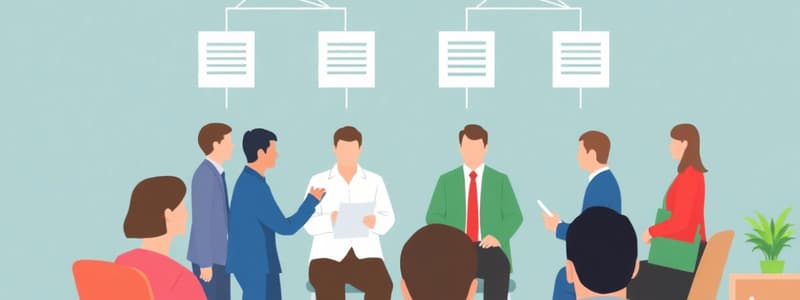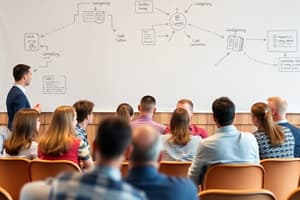Podcast
Questions and Answers
What is a key characteristic that differentiates leadership from management?
What is a key characteristic that differentiates leadership from management?
- Planning and coordinating tasks
- Measuring and monitoring work
- Focus on effective processes
- Emphasis on influencing and enabling others (correct)
According to the definitions given, what is the primary purpose of leadership?
According to the definitions given, what is the primary purpose of leadership?
- To establish effective managerial processes
- To set long-term objectives for the organization
- To monitor performance metrics
- To enable others to achieve goals they couldn't alone (correct)
What potential issue can arise from differing leadership styles within a project?
What potential issue can arise from differing leadership styles within a project?
- Enhanced project outcomes
- Increased conflict among team members (correct)
- Improved team cohesion
- Greater clarity in goal achievement
Which of the following best describes a leader's role in relation to organizational strategy?
Which of the following best describes a leader's role in relation to organizational strategy?
What is organizational culture primarily defined as?
What is organizational culture primarily defined as?
How does organizational culture impact decision-making processes within a team?
How does organizational culture impact decision-making processes within a team?
Which leadership activity is essential for delivering intended project outcomes?
Which leadership activity is essential for delivering intended project outcomes?
Which leadership style is characterized by a more hands-off approach?
Which leadership style is characterized by a more hands-off approach?
Which type of organizational culture focuses on innovation and flexibility?
Which type of organizational culture focuses on innovation and flexibility?
What is one purpose of organizational culture?
What is one purpose of organizational culture?
What does emotional intelligence emphasize as crucial for effective leadership?
What does emotional intelligence emphasize as crucial for effective leadership?
Which quality is not considered essential for effective leadership?
Which quality is not considered essential for effective leadership?
What aspect of projects does organizational culture influence?
What aspect of projects does organizational culture influence?
Which leadership theory focuses on individual traits and characteristics of the leader?
Which leadership theory focuses on individual traits and characteristics of the leader?
Which of the following is NOT a component of emotional intelligence?
Which of the following is NOT a component of emotional intelligence?
What characterizes a Level 5 leader in the 5 Levels of Leadership model?
What characterizes a Level 5 leader in the 5 Levels of Leadership model?
Which behavior best describes a competent manager according to the 5 Levels of Leadership?
Which behavior best describes a competent manager according to the 5 Levels of Leadership?
What is a primary focus of management as opposed to leadership?
What is a primary focus of management as opposed to leadership?
Which level in the 5 Levels of Leadership model focuses on working effectively within group settings?
Which level in the 5 Levels of Leadership model focuses on working effectively within group settings?
What distinguishes a status quo challenger from a typical manager?
What distinguishes a status quo challenger from a typical manager?
Organizational culture has no impact on how decisions are made within a team.
Organizational culture has no impact on how decisions are made within a team.
Clan culture prioritizes collaboration, trust, and employee well-being.
Clan culture prioritizes collaboration, trust, and employee well-being.
Hierarchy culture is primarily focused on innovation and flexibility.
Hierarchy culture is primarily focused on innovation and flexibility.
Market culture aims for competitiveness and results-oriented goals.
Market culture aims for competitiveness and results-oriented goals.
Organizational culture provides a sense of uncertainty to the team or employees.
Organizational culture provides a sense of uncertainty to the team or employees.
Leadership is the action of managing a group of people or an organization.
Leadership is the action of managing a group of people or an organization.
Effective leadership includes influencing, monitoring, and enabling the project team.
Effective leadership includes influencing, monitoring, and enabling the project team.
Both leadership and management activities are considered unimportant in delivering project outcomes.
Both leadership and management activities are considered unimportant in delivering project outcomes.
A leader's role primarily involves creating a vision and formulating immediate objectives for the organization.
A leader's role primarily involves creating a vision and formulating immediate objectives for the organization.
Organizational culture can add pressure to align with project goals.
Organizational culture can add pressure to align with project goals.
A Level 5 leader is characterized by a combination of personal arrogance and professional weakness.
A Level 5 leader is characterized by a combination of personal arrogance and professional weakness.
Management primarily engages in day-to-day caretaker activities and operational oversight.
Management primarily engages in day-to-day caretaker activities and operational oversight.
A contributing team member in the 5 Levels of Leadership model is someone who contributes individual capabilities to the group objectives.
A contributing team member in the 5 Levels of Leadership model is someone who contributes individual capabilities to the group objectives.
Transactional influence is primarily used by leaders to inspire followers through vision and commitment.
Transactional influence is primarily used by leaders to inspire followers through vision and commitment.
The role of a competent manager involves organizing people and resources towards predetermined goals.
The role of a competent manager involves organizing people and resources towards predetermined goals.
How does organizational culture shape project management practices within a team?
How does organizational culture shape project management practices within a team?
In what ways can a project manager's effectiveness be influenced by the organizational culture they operate in?
In what ways can a project manager's effectiveness be influenced by the organizational culture they operate in?
Explain the role of leadership style in the context of varying organizational cultures.
Explain the role of leadership style in the context of varying organizational cultures.
What are the implications of a strong market culture on project outcomes and team dynamics?
What are the implications of a strong market culture on project outcomes and team dynamics?
Discuss the potential challenges a project manager might face in a hierarchy culture.
Discuss the potential challenges a project manager might face in a hierarchy culture.
Organizational culture influences the ways in which people interact, how decisions are made, and ultimately the way they share (or do not share) __________.
Organizational culture influences the ways in which people interact, how decisions are made, and ultimately the way they share (or do not share) __________.
The __________ culture emphasizes innovation, flexibility, and a dynamic approach to problem-solving.
The __________ culture emphasizes innovation, flexibility, and a dynamic approach to problem-solving.
Clan culture prioritizes __________, trust, and employee well-being within an organization.
Clan culture prioritizes __________, trust, and employee well-being within an organization.
Hierarchy culture centers on stability, control, and __________ efficiency.
Hierarchy culture centers on stability, control, and __________ efficiency.
Organizational culture provides a sense of __________ to the team or employees.
Organizational culture provides a sense of __________ to the team or employees.
What is considered the main cause of project failure according to the content?
What is considered the main cause of project failure according to the content?
How should communication be conveyed to ensure effectiveness?
How should communication be conveyed to ensure effectiveness?
Which statement best describes the definition of communication?
Which statement best describes the definition of communication?
What role does listening play in effective communication?
What role does listening play in effective communication?
Which of the following is NOT a consideration in effective communication?
Which of the following is NOT a consideration in effective communication?
Which percentage of meaning in communication is conveyed through words according to the 7-38-55 rule?
Which percentage of meaning in communication is conveyed through words according to the 7-38-55 rule?
What type of noise is primarily caused by the environment or transmission methods in communication?
What type of noise is primarily caused by the environment or transmission methods in communication?
Which of the following is NOT considered a barrier to effective communication?
Which of the following is NOT considered a barrier to effective communication?
What is the first level of listening, where one is primarily focused on their own thoughts?
What is the first level of listening, where one is primarily focused on their own thoughts?
Which strategy is recommended to improve listening skills during a conversation?
Which strategy is recommended to improve listening skills during a conversation?
What is the primary characteristic of low context communication?
What is the primary characteristic of low context communication?
How does multitasking during listening affect communications?
How does multitasking during listening affect communications?
What is a recommended practice for effective writing in communication?
What is a recommended practice for effective writing in communication?
What is the effect of listening with only part of the brain?
What is the effect of listening with only part of the brain?
What approach is beneficial when trying to understand a speaker's message?
What approach is beneficial when trying to understand a speaker's message?
What is the primary purpose of a quick feedback loop in communication?
What is the primary purpose of a quick feedback loop in communication?
Which type of communication is considered informal?
Which type of communication is considered informal?
What does encoding in the communication process refer to?
What does encoding in the communication process refer to?
Which of the following best describes push communication?
Which of the following best describes push communication?
What does non-verbal communication primarily rely on?
What does non-verbal communication primarily rely on?
Flashcards
Organizational Culture
Organizational Culture
A pattern of shared values and beliefs, creating norms of behaviour within an organization.
Impact of Culture on Projects
Impact of Culture on Projects
Organizational culture influences project focus, measurement, resource allocation, and reactions to incidents/crises.
Adhocracy Culture
Adhocracy Culture
Organizational culture emphasizing innovation, flexibility, and dynamic problem-solving.
Clan Culture
Clan Culture
Signup and view all the flashcards
Market Culture
Market Culture
Signup and view all the flashcards
Management vs. Leadership
Management vs. Leadership
Signup and view all the flashcards
Level 5 Leadership
Level 5 Leadership
Signup and view all the flashcards
Level 4 Leadership
Level 4 Leadership
Signup and view all the flashcards
Level 3 Leadership
Level 3 Leadership
Signup and view all the flashcards
Level 2 Leadership
Level 2 Leadership
Signup and view all the flashcards
Leadership Definition
Leadership Definition
Signup and view all the flashcards
Leadership vs. Management
Leadership vs. Management
Signup and view all the flashcards
Leadership Qualities
Leadership Qualities
Signup and view all the flashcards
Leadership Impact on Projects
Leadership Impact on Projects
Signup and view all the flashcards
Leadership's role in managing projects
Leadership's role in managing projects
Signup and view all the flashcards
Leadership Style
Leadership Style
Signup and view all the flashcards
Coach Leadership
Coach Leadership
Signup and view all the flashcards
Visionary Leadership
Visionary Leadership
Signup and view all the flashcards
Trait Theory of Leadership
Trait Theory of Leadership
Signup and view all the flashcards
Emotional Intelligence (EQ) in Leadership
Emotional Intelligence (EQ) in Leadership
Signup and view all the flashcards
Change Creator
Change Creator
Signup and view all the flashcards
Transactional Influence
Transactional Influence
Signup and view all the flashcards
Impact of Culture on Leadership
Impact of Culture on Leadership
Signup and view all the flashcards
Effective Leadership Qualities
Effective Leadership Qualities
Signup and view all the flashcards
Project Management & Leadership
Project Management & Leadership
Signup and view all the flashcards
Hierarchy Culture
Hierarchy Culture
Signup and view all the flashcards
What is Organizational Culture?
What is Organizational Culture?
Signup and view all the flashcards
What is the impact of culture on projects?
What is the impact of culture on projects?
Signup and view all the flashcards
What is Adhocracy Culture?
What is Adhocracy Culture?
Signup and view all the flashcards
What is Clan Culture?
What is Clan Culture?
Signup and view all the flashcards
What is Market Culture?
What is Market Culture?
Signup and view all the flashcards
Types of Organizational Culture
Types of Organizational Culture
Signup and view all the flashcards
Culture's Impact on PM
Culture's Impact on PM
Signup and view all the flashcards
What is Communication?
What is Communication?
Signup and view all the flashcards
Why is Communication Important in Projects?
Why is Communication Important in Projects?
Signup and view all the flashcards
What is Encoding and Decoding?
What is Encoding and Decoding?
Signup and view all the flashcards
What are Barriers to Communication?
What are Barriers to Communication?
Signup and view all the flashcards
How does Listening Help Communication?
How does Listening Help Communication?
Signup and view all the flashcards
7-38-55 Rule
7-38-55 Rule
Signup and view all the flashcards
Communication Noise
Communication Noise
Signup and view all the flashcards
Active Listening
Active Listening
Signup and view all the flashcards
Barriers to Communication
Barriers to Communication
Signup and view all the flashcards
What are the Listening Levels?
What are the Listening Levels?
Signup and view all the flashcards
Feedback Loops
Feedback Loops
Signup and view all the flashcards
Verbal Communication
Verbal Communication
Signup and view all the flashcards
Non-Verbal Communication
Non-Verbal Communication
Signup and view all the flashcards
Visual Communication
Visual Communication
Signup and view all the flashcards
Push Communication
Push Communication
Signup and view all the flashcards
Emphasize Sender's Perspective
Emphasize Sender's Perspective
Signup and view all the flashcards
Low-Context Communication
Low-Context Communication
Signup and view all the flashcards
High-Context Communication
High-Context Communication
Signup and view all the flashcards
Multitasking While Listening
Multitasking While Listening
Signup and view all the flashcards
Study Notes
Leading Projects in an Organization
- Organizational culture is important for project success
- Leadership versus management are discussed
- Leadership theories and different leadership styles are explored
- A class assignment (5 marks) is due next week 9
Organizational Culture
- A pattern of shared values and beliefs that produce certain norms of behaviour
- Influences how people interact, how decisions are made, and how knowledge is created and shared
- Organizational culture impacts resistance to change and how the organization operates day to day including project management
Purpose of Organizational Culture
- Provides a sense of identity to the team or employees
- Generates commitment to organization's vision and goals
- Guides how the organization operates
Types of Organizational Culture
- Adhocracy Culture: Emphasizes innovation, flexibility, and a dynamic approach to problem-solving
- Clan Culture: Emphasizes internal focus, collaboration, trust, and employee well-being
- Hierarchy Culture: Centers on stability, control, internal efficiency, formalized procedures, and clear organizational structures
- Market Culture: Aims for competitiveness, achievement, external positioning, and results-oriented goals
Impact of Culture on Projects
- Culture influences what the project focuses on, how it measures and controls tasks
- Impacts response to crises and critical incidents
- Affects criteria used to allocate resources
Impact of Culture on Project Managers
- Culture could affect how a project manager leads or manages the project
- Could contradict their leadership style, causing conflict
- Places added pressure to deliver based on culture rather than project goals
Leadership
- Defining leadership--various perspectives are discussed
- Taking time to define leadership is encouraged
Leadership vs Management
- Leadership is a method for inspiring to achieve goals and vision
- Management is about the daily running and tasks of an organization
5 Levels of Leadership
- Level 5: A leader builds enduring greatness
- Level 4: A leader catalyzes commitment and pursuit of a clear vision
- Level 3: A manager organizes people and resources to effectively achieve objectives
- Level 2: A team member contributes individually and works effectively in a group
- Level 1: An individual has good individual skills
Leadership Styles
- Various leadership styles are listed, including Coach, Visionary, Servant, Autocratic/Authoritarian, Laissez-faire, Democratic, Trendsetter, and Bureaucratic
Leadership Theory
- Essential qualities are discussed, including authenticity, curiosity, analytical prowess, adaptability, creativity, comfort with ambiguity, resilience, and empathy
Leadership Theories
- Trait Theory: Focuses on the characteristics of a leader, including physical traits, abilities, and personality
- Emotional Intelligence and Intellectual Intelligence (EQ and IQ): Emotional intelligence is a strong predictor of leadership emergence
- Situational Theory: Emphasizes the importance of considering the context when leading
- Transformational Theory: Relationship-based and motivating leadership focused on the positive relationship rather than penalty or reward
- Transactional Theory: Focuses on rewards and penalties as a means for motivation
After Class Assignment
- Students will choose either A or B
- A: For students who have not held a leadership role, focusing on learning from leaders
- B: For students who have held a leadership role, focusing on describing their leadership style
Next Week
- Review updated learning plans and due dates
- Review after-class assignment
- Week 9 topics include interpersonal conflict, team conflict, and communication
- Assignment 2 will be discussed
Studying That Suits You
Use AI to generate personalized quizzes and flashcards to suit your learning preferences.
Description
This quiz explores the crucial role of organizational culture in project management, focusing on leadership styles and theories. It delves into the impact of shared values and beliefs on team dynamics and decision-making processes. Understanding these aspects is vital for effective project implementation and fostering a strong organizational identity.





